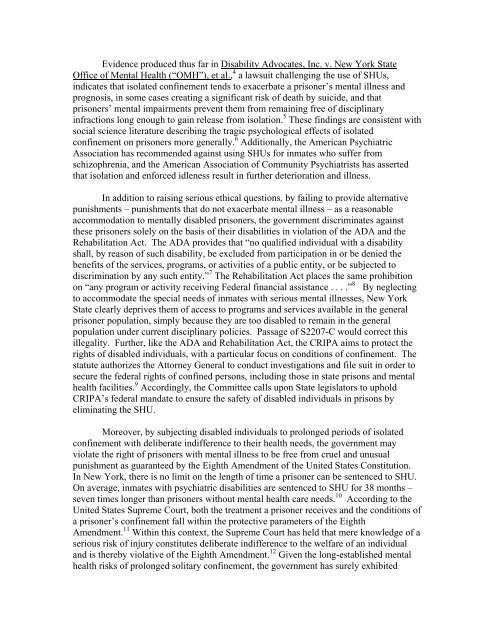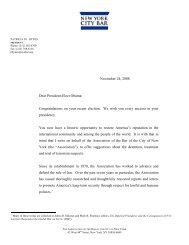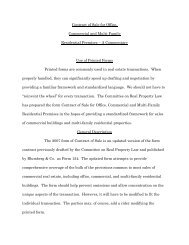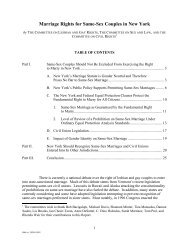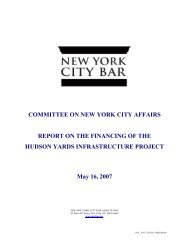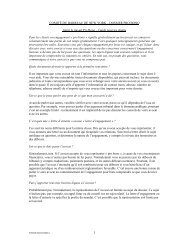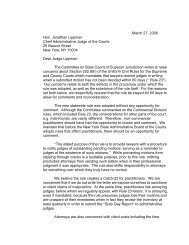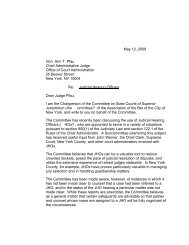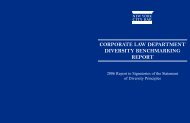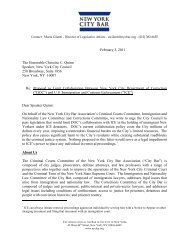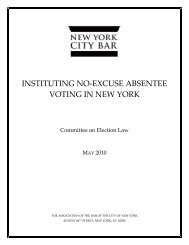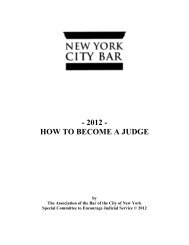Jayne Bigelsen (212) 382-6655 --- Director of Public Affairs
Jayne Bigelsen (212) 382-6655 --- Director of Public Affairs
Jayne Bigelsen (212) 382-6655 --- Director of Public Affairs
Create successful ePaper yourself
Turn your PDF publications into a flip-book with our unique Google optimized e-Paper software.
Evidence produced thus far in Disability Advocates, Inc. v. New York State<br />
Office <strong>of</strong> Mental Health (“OMH”), et al., 4 a lawsuit challenging the use <strong>of</strong> SHUs,<br />
indicates that isolated confinement tends to exacerbate a prisoner’s mental illness and<br />
prognosis, in some cases creating a significant risk <strong>of</strong> death by suicide, and that<br />
prisoners’ mental impairments prevent them from remaining free <strong>of</strong> disciplinary<br />
infractions long enough to gain release from isolation. 5 These findings are consistent with<br />
social science literature describing the tragic psychological effects <strong>of</strong> isolated<br />
confinement on prisoners more generally. 6 Additionally, the American Psychiatric<br />
Association has recommended against using SHUs for inmates who suffer from<br />
schizophrenia, and the American Association <strong>of</strong> Community Psychiatrists has asserted<br />
that isolation and enforced idleness result in further deterioration and illness.<br />
In addition to raising serious ethical questions, by failing to provide alternative<br />
punishments – punishments that do not exacerbate mental illness – as a reasonable<br />
accommodation to mentally disabled prisoners, the government discriminates against<br />
these prisoners solely on the basis <strong>of</strong> their disabilities in violation <strong>of</strong> the ADA and the<br />
Rehabilitation Act. The ADA provides that “no qualified individual with a disability<br />
shall, by reason <strong>of</strong> such disability, be excluded from participation in or be denied the<br />
benefits <strong>of</strong> the services, programs, or activities <strong>of</strong> a public entity, or be subjected to<br />
discrimination by any such entity.” 7 The Rehabilitation Act places the same prohibition<br />
on “any program or activity receiving Federal financial assistance . . . .” 8 By neglecting<br />
to accommodate the special needs <strong>of</strong> inmates with serious mental illnesses, New York<br />
State clearly deprives them <strong>of</strong> access to programs and services available in the general<br />
prisoner population, simply because they are too disabled to remain in the general<br />
population under current disciplinary policies. Passage <strong>of</strong> S2207-C would correct this<br />
illegality. Further, like the ADA and Rehabilitation Act, the CRIPA aims to protect the<br />
rights <strong>of</strong> disabled individuals, with a particular focus on conditions <strong>of</strong> confinement. The<br />
statute authorizes the Attorney General to conduct investigations and file suit in order to<br />
secure the federal rights <strong>of</strong> confined persons, including those in state prisons and mental<br />
health facilities. 9 Accordingly, the Committee calls upon State legislators to uphold<br />
CRIPA’s federal mandate to ensure the safety <strong>of</strong> disabled individuals in prisons by<br />
eliminating the SHU.<br />
Moreover, by subjecting disabled individuals to prolonged periods <strong>of</strong> isolated<br />
confinement with deliberate indifference to their health needs, the government may<br />
violate the right <strong>of</strong> prisoners with mental illness to be free from cruel and unusual<br />
punishment as guaranteed by the Eighth Amendment <strong>of</strong> the United States Constitution.<br />
In New York, there is no limit on the length <strong>of</strong> time a prisoner can be sentenced to SHU.<br />
On average, inmates with psychiatric disabilities are sentenced to SHU for 38 months –<br />
seven times longer than prisoners without mental health care needs. 10 According to the<br />
United States Supreme Court, both the treatment a prisoner receives and the conditions <strong>of</strong><br />
a prisoner’s confinement fall within the protective parameters <strong>of</strong> the Eighth<br />
Amendment. 11 Within this context, the Supreme Court has held that mere knowledge <strong>of</strong> a<br />
serious risk <strong>of</strong> injury constitutes deliberate indifference to the welfare <strong>of</strong> an individual<br />
and is thereby violative <strong>of</strong> the Eighth Amendment. 12 Given the long-established mental<br />
health risks <strong>of</strong> prolonged solitary confinement, the government has surely exhibited


